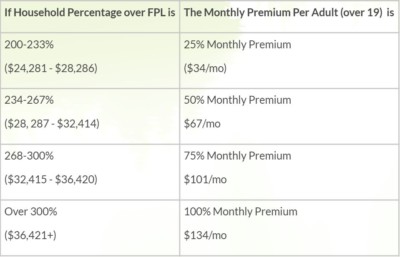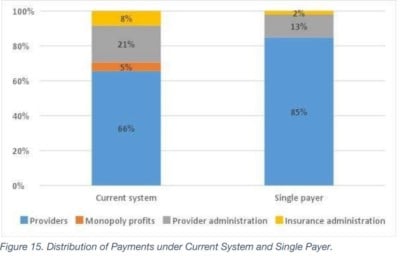Part of the Series
Fighting for Our Lives: The Movement for Medicare for All
Honest, paywall-free news is rare. Please support our boldly independent journalism with a donation of any size.
Activists in Washington State are busy gathering signatures in the hopes of putting a universal health care system on the ballot for a referendum in 2018.
Organizers for Whole Washington, who are leading the effort, tell Truthout they have about 60,000 signatures and need a total of 259,622 by July 6. Such a high threshold is difficult for a grassroots organization to meet, but head organizers — who were largely brought together from their experience working for Bernie Sanders’s presidential campaign in 2016 — are hoping to defy the odds.
If Initiative 1600 (I-1600) makes the ballot, the state would vote on it in November. The plan would create the Whole Washington Health Trust, the agency created by the state to create and administer the health system. It would lead to universal coverage and save the state $9 billion annually, according to an analysis from Gerald Friedman, a professor of economics at the University of Massachusetts.
The savings would be largely due to reduced administrative costs, the reduction in profits raked in by drug monopolies, and lower drug prices since the Washington Health Trust would have such a large pool of patients. “A single agency negotiating prices for 7 million residents of Washington should negotiate dramatically lower price,” the report said. Polling shows 64 percent of Washington State respondents believe the government has the responsibility to provide health care to all Americans.
The Origins of I-1600
Georgia Davenport, campaign director for Whole Washington, has heard the argument against single-payer many times: Such policies are “politically impossible,” would “never happen” and amount to giving away “free stuff.”
Since the Bernie Sanders campaign brought the issue into mainstream political discourse, however, Davenport and many others see a different reality: one where the richest nation in human history is a shameful outlier within the industrialized world because it does not guarantee universal health care. The Sanders campaign’s emphasis on creating a Medicare for All single-payer system, organizers tell Truthout, was both inspiring and educational for advocates in Washington State.
“Most of us thought that these policies were ‘pie in the sky’ because our elected officials and media would never discuss them,” Davenport told Truthout. “By finding each other at [campaign] events, through running as delegates and on social media, his supporters, like myself, discovered that the ideas are not revolutionary at all.”
Her statement captures the importance of Sanders’s losing bid for the presidency in the movement for single-payer. Not only did he bring the issue into mainstream political debate — in the media, in presidential debates and in town hall meetings — but the campaign also brought like-minded people together.
So, Davenport and several other organizers, many of whom met each other during Sanders’s presidential campaign, decided to get active. This is how I-1600 was born.
“I would say it wasn’t his campaign that inspired me to be more involved, but the knowledge that there were millions of other people who believed in single-payer health care, economic and racial justice, living wages,” Davenport says. “Basically, everything that all other developed countries have figured out for years, but our own representatives seem incapable of comprehending, let alone passing.”
In a sense, Initiative 1600 is the first ballot referendum for universal health care to spring from the Sanders movement. Given the growing importance of ballot initiatives for progressive change, this could be a significant development. Could more ballot referendums, in addition to an influx of progressive candidates, be on the way? Could the first state to pass universal and/or single-payer health care do it with a ballot question, rather than legislation? It isn’t unthinkable: It’s how marijuana is becoming legal, for instance.
What Would I-1600 Do?
While statewide plans of this nature are often described as “single-payer” — a sort of catch-all for terms that create a (mostly) public, universal system — they technically adopt multiple payers. “States acting alone cannot establish a bona fide single payer system. There are too many major barriers that would prevent states from totally replacing their fragmented financing infrastructure,” writes Don McCanne, a Health Policy Fellow with Physicians for a National Health Program (PNHP).
This is true of virtually any statewide “single-payer,” plan. Federal funding streams, such as Medicare, Medicaid and the Veterans Health Administration, “prevent a state from creating a pure single-payer system,” as Public Citizen observed in a 2013 report. Despite this, it is common to see the term “single-payer” used. In fact, it’s this language that is used in Friedman’s economic analysis of I-1600.
Nonetheless, these plans do reduce the number of payers in a significant way. Washington currently has 13 different private companies, a total of 154 separate health insurance plans, Friedman writes. This “inflates costs for insurers and providers” and leads to “monopoly pricing.”
The organizers behind the plan tell Truthout they have been using the term “universal health care” to describe the bill to constituents.
The plan for I-600 would “create a single nonprofit health financing entity called the [W]hole Washington Health Trust,” it says. “All residents of the state of Washington are eligible for coverage through this chapter.” The plan also mandates that administrative costs do not exceed 7 percent of total expenditures. This would be down from administrative costs of about 25 percent, according to Friedman’s analysis.
One unique aspect of I-1600 is that it gives Medicare beneficiaries a chance to transition into the state health trust, pending federal waivers, and the state will reimburse anyone making under 200 percent of the federal poverty level for some of their premiums in the interim.
The language in I-1600 clearly leaves room for supplemental private and employer-based health insurance as well. “Nothing in this chapter limits a resident’s right to obtain coverage for health care benefits in excess of those available under the trust.” The plan also gives employers the ability to offer additional, supplemental insurance coverage.
The Argument Over Cost Sharing
While Washington residents would not have to deal with a co-pay to see a doctor, they are potentially liable for a maximum $250 annually in co-pays for prescription drugs. Likewise, citizens earning more than 200 percent of the federal poverty level would have to pay monthly premiums which would be tiered based on their income. In Friedman’s analysis, someone making $25,000 a year would pay $34 a month, while someone making over the limit would pay $134.


These means-tested premiums and drug co-pays do make some activists nervous. The Democratic Socialists of America (DSA), for instance, demands the following in its statement of principles on health care: “No copays, no fees, no deductibles and no premiums. Ever.” Likewise, Sanders’s Medicare for All plan does not have co-pays or means-testing, in part due to pressure from single-payer activists, such as Margaret Flowers, who implored the senator not to “begin from a position of compromise.”
DSA member Andrej Markovčič argued that local chapters of the organization should not support the measure, saying it was well-intentioned but would maintain “vulnerabilities that can only be fully overcome by a truly universal, free at point of service, federal single-payer healthcare system.” Instead he wants “a system that is fully funded through our collective (income based) tax dollars.”
It must be noted, however, that the DSA statement and Sanders’s legislation are federal proposals, and the federal government can print money, while states cannot (one of many reasons federal plans have more savings).
Organizers for I-1600 share the goal of a national Medicare for All plan. They also know that getting even a committee hearing on federal plans is impossible given the current makeup of Congress, while the Washington referendum process gives them a chance to get something done now. Even if the Democrats were to take back both houses, as of this writing, the Democratic leaders in Congress (Nancy Pelosi, Chuck Schumer) are opponents of the policy.
“This is as close to single-payer as we could get,” Davenport says.
A “savings calculator” on the Whole Washington website allows residents and business owners to see if the new plan would benefit or hurt them, and by how much. Davenport says the tool has helped reach new people and produce new volunteers.
Organizers also point to the Canadian example. Saskatchewan passed universal hospital care in 1947 and a full province-wide universal system in 1962. Soon the rest of the country caught on, province by province, until Canada passed its Medicare system in 1984. The system, while far from perfect, is well-liked in Canada and ranks ahead of the United States in almost every metric while costing much less as a percentage of GDP.
Defying the Odds
It is extremely rare for citizen-led ballot initiatives to meet mandated signature requirements without paid help to collect them, organizers say. To combat these long odds, Whole Washington is asking residents of the state to order and sign petitions, and asking anyone who supports the plan, in any state, to donate to the effort.
“A lot of these organizers do not have a lot of experience or contacts with unions and politicians, except for their work for Sanders,” Friedman told Truthout. “What they have is a tenacious energy and a desire to act — and act now.”
Recent efforts to create a statewide universal health care system have run into problems. In Vermont, a timid legislature and governor gave up on a promising effort to bring single-payer — or something close to it — to the state in 2014. In California and New York, single-payer bills have been vetoed or stalled in the legislature. In Colorado, Koch-funded groups smeared “ColoradoCare,” which was beat handily in a ballot referendum in 2016.
As a result, some labor unions and progressive organizations are hesitant to get behind the new initiative. “They are worried about electing Democrats to Congress, and they are wary of putting resources and institutional support behind another ballot referendum,” Friedman says.
For instance, Health Care for All, Washington (HCFA-WA), which does support single-payer legislation for the state, has not publicly commented on I-1600 at all.
“Health Care for All WA is not on the list [of supporters] due to their hesitation to go the path of a ballot measure. They are afraid if we lose, like Colorado did, that it will set back the single-payer movement,” Davenport said. “I disagree. Many social justice issues failed miserably until they succeeded…. I also feel like allies staying out of the fight makes it harder to win.”
The legislation for single-payer in Washington State, called the Washington Apple Care Trust, has been around for years, she notes, and has never made it out of committee.
Truthout reached out to HCFA-WA, to ask if the group supported or opposed the ballot initiative. HCFA-WA President Marcia Stedman declined to comment.
Advocates for the ballot question do have their share of allies, however. More than 50 organizations have already endorsed the plan. They include Our Revolution and several of its local chapters, PNHP – Western Washington, Washington NOW, and scores of other local groups.
Support from women’s groups has also proved important for the initiative. In Colorado, for instance, state laws have made covering abortion through a statewide health care plan more difficult, leading to opposition from some women’s groups. This is not the case in Washington State.
While Democrats control all three branches of the Washington State government, the state party and most of its politicians remain on the sidelines for I-1600. In contrast, Colorado’s effort to pass a similar ballot initiative was opposed by a Democratic governor and some progressive organizations like Progress Now Colorado.
There are also other potential complications. For instance, federal waivers will be required at some point, although organizers said they intentionally planned the system in such a way as to minimize the disruption caused by the waiver process.
“The state is given a year to propose a plan for seeking waivers,” said Whole Washington organizer Erin Georgen. “In the meantime, residents eligible for Medicaid, public employee benefits and Medicare will be able to enroll into the trust to administer their federally funded benefits…. The trust will then use state level revenues to supplement those benefits [and] to reimburse low income Medicare eligible residents.”
“There Is Always a Reason Not to Do Something”
Still, some unions, progressive groups and politicians are staying away, concerned about another misfire at the state level and focused on electing Democrats to Congress.
“You know, there is always a reason not to do something,” Friedman told Truthout. “Sometimes you just have to do it.” Davenport agrees. “Luckily, we have a way to circumvent our own ineffective elected officials here,” she says.
And if they fail to gather the signatures?
“Then we will get them in a future election on our second try,” Davenport says. It’s clear that residents are no longer accepting “no” for an answer when they demand that health care be a human right.
Eventually, a state is bound to win.
Speaking against the authoritarian crackdown
In the midst of a nationwide attack on civil liberties, Truthout urgently needs your help.
Journalism is a critical tool in the fight against Trump and his extremist agenda. The right wing knows this — that’s why they’ve taken over many legacy media publications.
But we won’t let truth be replaced by propaganda. As the Trump administration works to silence dissent, please support nonprofit independent journalism. Truthout is almost entirely funded by individual giving, so a one-time or monthly donation goes a long way. Click below to sustain our work.
